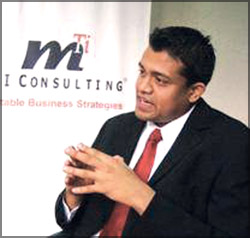Corporate Governance key to success of family businesses - MTI
HEMAS, MAS, Ceylon Biscuits and Brandix are among the most successful
Sri Lankan companies, not just in terms of market domination and
profitability but also in terms of corporate governance and social
responsibility. These are family businesses that have been transformed
into corporate entities.
A key feature of their successful transformation is the concerted
efforts on Corporate Governance and Social Responsibility, which have
been internationally recognised.
Family businesses are an integral part in the Business World. Some
have developed to levels of conquering
|

Yatila Wijemanne |
the global stage, whilst others
continue to grow within their markets.
These companies possessed the leadership, vision, determination and
the vigour to succeed. Nonetheless, the pondering question is whether
these forms of companies could successfully continue as they have done
previously.
The answer would be ‘yes’ - if corporate governance did not emerge to
the platform to transform the corporate world and with it the community
we live in.
Corporate governance is considered the central pillar of the
corporate structure. The Asian financial - crisis and failures of
corporations such as Enron sent shock waves across corporate board -
rooms that laws in place to regulate the operations of boards will be
strengthened. This is because investor confidence fell to a significant
low.
However, international governments understanding the gravity of the
problem enacted numerous laws, regulations and codes to combat the
proliferation of loss in investor confidence.
As a result, investor confidence began an upward trend as the boards
of directors’ were under greater scrutiny and investor protection laws
were seriously considered by respective institutions.
Despite the development of such laws, regulations and codes governing
companies, a very important cluster within the corporate structure -
Family Owned Businesses (FOB) were left to compete in the international
market with limited assistance toward re-structuring their framework on
corporate governance.
Like any other forms of business, family businesses also require
strong leadership, motivation and an organised management structure. The
competition faced by FOB lead to an issue in continuity.
Furthermore, FOB are to a large extent unable to attract inward
foreign direct investment, as opposed, to non-FOBs were able to attract
foreign direct investment. This situation is even prevalent today,
especially in the Asian region.
In Asia, FOB have been integral in promoting economic development.
For instance in countries such as South Korea and Indonesia FOB have
been extremely influential in driving the economic success, especially
prior to the Asian financial crisis.
In the Middle East family companies account for 75% of business in
the region which is estimated at US $ 500 billion. However, the
structure of internal corporate governance has been weak. As a result,
these companies have been unable to fully maximise their potential.
Due to this the Middle East Family Owned Businesses Forum has been
created with the assistance of expert external consultants to develop
corporate governance. During a recent discussion with a leading CEO in
Sri Lanka, it was mentioned that the company which is a FOB, was
achieving great heights in the national and international markets.
In accordance with MTI Consulting research and other international
findings family businesses when re-structuring the internal workings of
corporate governance have experienced problems in relation to best
practices for board procedures, ownership, succession, independency of
directors, compensation and board-family relations.
Furthermore, areas for concern include incentives, disclosure,
equality and investment.
However, proper advisory and assistance have enabled a number of
large family companies to successfully overcome such problems. For
example, in the Gulf region family businesses are undergoing a rigorous
process of streamlining their structure on corporate governance in order
to enhance the company’s competitiveness in North America and Europe.
This process has brought about a significant improvement in competing
in developed regions across the World. In tracing the background to
family businesses, most owners seem to underestimate the psychological
aspect. In the first generation one person would be at the helm,
therefore decision-making and managing the business would be in the
hands of that person.
In the second generation the decision-making of the company would be
in the hands of siblings. In the third generation cousins would be
involved at the helm.
As a result, the psychological aspect at the helm has gone through a
number of transformations, which in-turn might cause adverse
consequences on the business. In light of the above it would be vitally
important for FOB to independently structure corporate governance to
avoid unwanted business and even family related tensions.
From a holistic point of view reforming the structure on corporate
governance within family companies seems a growing necessity. As
discussed the reforming process would generate a number of important
benefits to the company and the community at large.
Therefore, in conclusion the future seems to show a requirement for
companies to abide ethically by following principles of good corporate
governance within the national and global corporate system.
MTI is a leading multinational consultancy company with its Head
quarters in Bahrain and operating in Dubai, Abu Dhabi, India, Pakistan,
Bangladesh, Malaysia and Sri Lanka. Further MTI operates through
alliances in a number of countries in Europe, North and South America.
MTI Consultancy under the leadership and guidance of CEO Hilmy Cader
has been instrumental in handling over 275 cross-industry projects
across 33 countries, five continents since its inception ten years ago.
(The article has been conceptualised by the Project Manager and
Senior Business Analyst of the Legal and Governance Unit Yatila
Wijemanne) |

